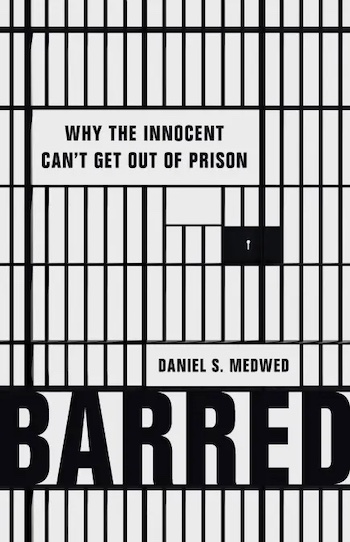Book Review: “Barred: Why the Innocent Can’t Get Out of Prison” — Blind Justice
By Bill Littlefield
Daniel S. Medwed demonstrates just how astronomical the odds are against anyone who tries to question a guilty verdict, no matter how suspect the conviction.
Barred: Why the Innocent Can’t Get Out of Prison by Daniel S. Medwed. Basic Books, 321 pages.
 Nearly all of Barred, Daniel S. Medwed’s exploration of the branch of the justice system responsible for providing people who’ve been unjustly incarcerated with the opportunity to seek relief, is profoundly discouraging.
Nearly all of Barred, Daniel S. Medwed’s exploration of the branch of the justice system responsible for providing people who’ve been unjustly incarcerated with the opportunity to seek relief, is profoundly discouraging.
Medwed, University Distinguished Professor of Law and Criminal Justice at Northeastern University, demonstrates that the avenues allegedly available to innocent men and women are hopelessly clogged by complicated, often pointless, procedural requirements. Attempts to free people serving time for crimes they didn’t commit are likely to fail for lots of other reasons, too. As Medwed points out, judges rarely reverse themselves, and their colleagues nearly always assume that the courts got their convictions right the first time. As he writes: “collegiality and shared experience partially explain why deference is the default at the appellate level.”
Medwed recognizes that the most effective way to introduce lay readers to the many complexities of the appeal process, habeas corpus, and various other mechanisms is through story-telling. It is effective, and some of his stories are horrifying. We might assume that if an investigation reveals that an accused person has had hopelessly incompetent representation there should – at the very least – be another trial. Such is not necessarily the case.
Consider Felipe Rodriguez. He was accused of murder in 1987. His attorney was seriously distracted. He “had been recently widowed and had started stealing money from clients to mollify loan sharks clamoring for repayment of a family member’s gambling debts.” The attorney “put up a meager defense.” More specifically, he failed to bring up dramatic discrepancies between the appearance of his client and that of the man witnesses had identified as the assailant. Rodriguez, who had never been arrested and had no history of violence, was convicted and sentenced to twenty-five years to life. Despite the very shaky case against him, Rodriguez “lost his direct appeal as well as his attempts at post-conviction relief.” Years later, requests by the Innocence Project for material that might have exonerated Rodriguez on the basis of DNA were unsuccessful. The evidence “had disappeared, lost in the chaos of New York City’s storage facilities.” But nearly thirty years after Rodriguez was incarcerated, independent investigations turned up documents that demonstrated that the police had relied on “misidentification” to build their case. The police, prosecutor, and a couple of different judges over a couple of decades had gone along for the ride, because they were more interested in “finality, efficiency, and deference to trial-level decisions” than they were with accuracy and, more to the point, justice.
In 2019, the charges against Rodriguez were dismissed.
Barred demonstrates that what happened to Felipe Rodriguez was representative of what has happened to many victims of a system heavily weighted against anyone who tries to question a guilty verdict, no matter how suspect the conviction.
As Medwed points out, “finality is a fallacy when it’s weaponized to rationalize preventing viable innocence cases from seeing the light of day.” From the point when somebody is arrested, there is an imperative to demonstrate that the police got the right guy. Once somebody is convicted, sentenced and incarcerated, everybody involved in the system that’s supposed to provide the convicted person with the opportunity to demonstrate his or her innocence is more interested in moving on to the next conviction than in looking back at what they might have to acknowledge as a terrible mistake.
Toward the end of Barred, Medwed provides some suggestions for how the system might be modified. They include such mechanisms as the Innocence Inquiry Commission currently operating in North Carolina, which has “produced fifteen exonerations since its inception” two decades ago. But the author argues that much more thorough and ambitious reform is necessary if the judicial system is to aspire to the actual dispensing of justice. As Medved points out: “Whatever your views are about imprisonment – whether you believe it should be used extensively, occasionally, or not at all – those ensnared by the carceral state aren’t so different from you and me….They deserve to live in a country where substance wins over procedure.”
Bill Littlefield works with the Emerson Prison Initiative to help incarcerated men earn a college degree. His most recent novel is Mercy (Black Rose Writing, 2022)
Tagged: Barred, Basic Books, Bill Littlefield, Daniel Medwed, Justice System
